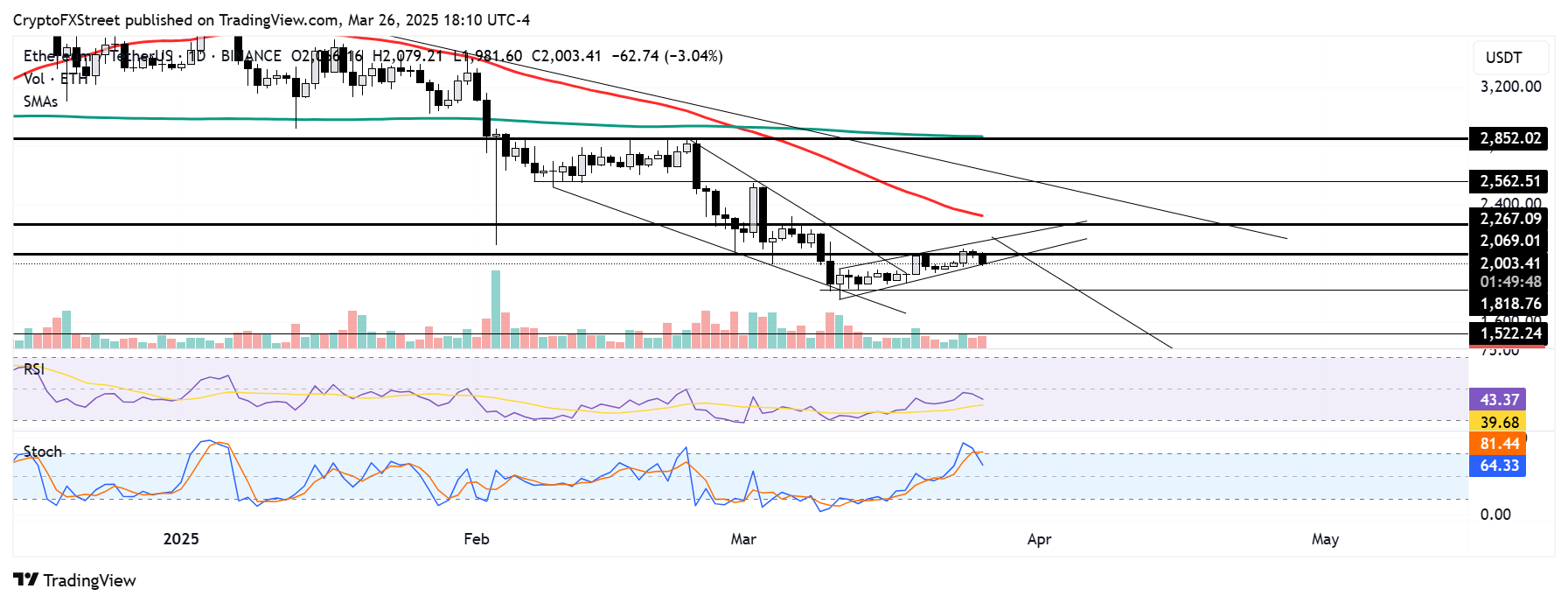Ethereum Price Forecast: ETH sees a downtick despite successful Pectra launch on Hoodi testnet
March 26, 2025
- Ethereum Pectra upgrade successfully went live on the Hoodi testnet after initial issues with Holesky and Sepolia.
- Developers could decide on Pectra’s mainnet launch date in the ACDC call on Thursday.
- ETH risks a sharp decline if it validates a developing bearish flag pattern.
Ethereum (ETH) is down 3% on Wednesday despite positive updates of the Pectra upgrade successfully going live on the Hoodi testnet. The top altcoin could sharply decline if it validates a bearish flag pattern by falling below $1,818.
Ethereum developers successfully activated the Pectra upgrade on the Hoodi testnet on Wednesday without experiencing any hiccups as of the time of writing.
Pectra could hit the Ethereum mainnet on April 25 if it continues running smoothly on Hoodi. Developers had earlier stated that Pectra will launch on mainnet at least 30 days after it goes live on Hoodi.
However, this will largely depend on the discussions and decisions of core developers in the Ethereum All Core Developers Consensus (ACDC) call on Thursday.
Testnets or test networks are environments to test or experiment on new features for a blockchain before deploying them on the mainnet.
The Hoodi testnet launched last Friday to enable developers to adequately test validator exits — opting out of consensus duties — due to issues with execution layer clients that prevented sufficient Pectra testing on Holesky and Sepolia testnets.
“Upgrades are always going to have their hiccups. If delaying the mainnet launch ensures Pectra’s success — it’s a worthwhile tradeoff,” Nick Johnson, founder of Ethereum Name Service, told FXStreet. “While some in the community may find Etheruem’s methodical approach frustrating, it’s a testament to the core developers’ commitment to quality over speed,” he added.
Pectra will introduce several features to improve Ethereum’s scalability, user experience and validator consolidation. Some of the major features include sponsored transactions, payment of gas fees in other ERC-20 tokens, transaction batching, wallet recovery, blobs per block increase and expanding the staking limit from 32 ETH to 2,048 ETH.
Ethereum saw $50.97 million in futures liquidations in the past 24 hours, per Coinglass data. The total amount of liquidated long and short futures positions accounted for $41.83 million and $9.14 million, respectively.
ETH saw a rejection at the $2,069 resistance and is testing the lower boundary of an ascending trendline. A decline below this trendline could see ETH test the support at $1,818.
ETH/USDT daily chart
If ETH breaches $1,818, it would validate a bearish flag pattern, potentially sending its price below the $1,522 key level. A bearish flag pattern indicates the continuation of a downtrend.
The Relative Strength Index (RSI) is trending downward below its neutral level while the Stochastic Oscillator’s %K line crossed below its moving average line. This indicates a rising bearish pressure.
A firm daily candlestick close above the upper ascending trendline will invalidate the thesis and potentially spark an uptrend in ETH.
Ethereum is a decentralized open-source blockchain with smart contracts functionality. Its native currency Ether (ETH), is the second-largest cryptocurrency and number one altcoin by market capitalization. The Ethereum network is tailored for building crypto solutions like decentralized finance (DeFi), GameFi, non-fungible tokens (NFTs), decentralized autonomous organizations (DAOs), etc.
Ethereum is a public decentralized blockchain technology, where developers can build and deploy applications that function without the need for a central authority. To make this easier, the network leverages the Solidity programming language and Ethereum virtual machine which helps developers create and launch applications with smart contract functionality.
Smart contracts are publicly verifiable codes that automates agreements between two or more parties. Basically, these codes self-execute encoded actions when predetermined conditions are met.
Staking is a process of earning yield on your idle crypto assets by locking them in a crypto protocol for a specified duration as a means of contributing to its security. Ethereum transitioned from a Proof-of-Work (PoW) to a Proof-of-Stake (PoS) consensus mechanism on September 15, 2022, in an event christened “The Merge.” The Merge was a key part of Ethereum’s roadmap to achieve high-level scalability, decentralization and security while remaining sustainable. Unlike PoW, which requires the use of expensive hardware, PoS reduces the barrier of entry for validators by leveraging the use of crypto tokens as the core foundation of its consensus process.
Gas is the unit for measuring transaction fees that users pay for conducting transactions on Ethereum. During periods of network congestion, gas can be extremely high, causing validators to prioritize transactions based on their fees.
Share:
Cryptos feed
Information on these pages contains forward-looking statements that involve risks and uncertainties. Markets and instruments profiled on this page are for informational purposes only and should not in any way come across as a recommendation to buy or sell in these assets. You should do your own thorough research before making any investment decisions. FXStreet does not in any way guarantee that this information is free from mistakes, errors, or material misstatements. It also does not guarantee that this information is of a timely nature. Investing in Open Markets involves a great deal of risk, including the loss of all or a portion of your investment, as well as emotional distress. All risks, losses and costs associated with investing, including total loss of principal, are your responsibility. The views and opinions expressed in this article are those of the authors and do not necessarily reflect the official policy or position of FXStreet nor its advertisers. The author will not be held responsible for information that is found at the end of links posted on this page.
If not otherwise explicitly mentioned in the body of the article, at the time of writing, the author has no position in any stock mentioned in this article and no business relationship with any company mentioned. The author has not received compensation for writing this article, other than from FXStreet.
FXStreet and the author do not provide personalized recommendations. The author makes no representations as to the accuracy, completeness, or suitability of this information. FXStreet and the author will not be liable for any errors, omissions or any losses, injuries or damages arising from this information and its display or use. Errors and omissions excepted.
The author and FXStreet are not registered investment advisors and nothing in this article is intended to be investment advice.
Search
RECENT PRESS RELEASES
Related Post



